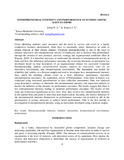ENTREPRENEURIAL INTENSITY AND PERFORMANCE OUTCOMES AMONG KENYAN FIRMS
Abstract
Given shrinking markets, price pressures and the need to survive and excel in a highly
competitive business environment, firms have to continually renew themselves in order to
remain relevant in their chosen markets. Corporate entrepreneurship is one of the ways to
enhance innovative and entrepreneurial activity of employees and to increase firm performance
through the creation of new products, services, strategy and organizational conditions (Bau &
Wagner, 2010). It is therefore necessary to understand the intensity of entrepreneurial activity in
firms and how this influences performance outcomes. By reviewing literature, an instrument was
developed based on four descriptors of an organizational climate for successful Corporate
Entrepreneurship, namely entrepreneurial mindset, support for innovation, rules for an
innovative environment, and intrapreneurial environment. The instrument was tested for
reliability and validity on a Kenyan sample and used to investigate how entrepreneurial intensity
(how much the enabling climate exists in a firm) influences performance outcomes
(entrepreneurial outcomes). An exploratory survey of39respondents’ from firms in Kenya was
conducted using structured questionnaires as data collection instruments. Data was analyzed
using descriptive statistics to determine the entrepreneurial intensity and regression analysis to
discern the influence of the intensity on performance outcomes. The results suggest that there is
low entrepreneurial intensity leading to moderate performance outcomes. The results of this
study are of practical significance in two ways. First, they reveal a low entrepreneurial intensity
in the studied firms and point to areas that need improvement. Secondly, the relative influence of
the entrepreneurial intensity dimensions on performance outcomes are revealed to aid in the
prioritization of actions necessary to achieve better performance. This is the first attempt at
investigation of entrepreneurial intensity using an instrument developed using a Kenyan sample.

